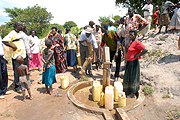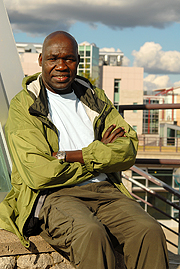UNBC Study: Unsafe Storage Ruining Clean Water in Developing Countries
December 19, 2012
|
International efforts to provide reliable sources of clean drinking water to some of the world’s most impoverished nations are being jeopardized by unsafe storage practices according to new research out of the University of Northern British Columbia (UNBC). Preliminary results of a study conducted by UNBC professor Chris Opio indicate that clean well water-- after transportation and storage--becomes nearly two-and-a-half times dirtier than water drawn from a contaminated well. “People are using clay pots and plastic jerry cans that are so dirty that they would ruin even the cleanest water,” says Dr. Opio, a professor of Ecosystem Science and Management. “This is a threat to the efforts of many NGOs and charities that dig wells in these countries.” Dr. Opio began examining stored water for E-coli, bacteria, and dioxins in Uganda in July 2011. “Our tests show that clean water from donated wells is ruined due to high rates of E-coli and fecal coliforms found first in the unclean jerry cans that are used for water transportation. The water is tainted even more during storage in unwashed clay pots,” says Dr. Opio, who grew up in Uganda. “We’re also going to be testing samples of the water for Bisphenol-A (BPA) at UNBC’s labs in the coming months.” In 2010, Canada was the first country to declare BPA a toxic chemical. Dr. Opio established a charity—the Northern Uganda Development Foundation (NUDF)—in 2007 with UNBC employee Tony Donovan, in part to dig wells and provide fresh, clean drinking water for Ugandans. To date, the NUDF has dug 42 wells, which provide water to more than 50,000 people in that country. In November of 2010, Dr. Opio was recognized on CBC Television’s “Champions of Change” program, which celebrates Canada’s top volunteers. He was nominated as one of the top ten volunteers from across Canada who had made “an invaluable contribution to society, serving our community at home, and helping our neighbours abroad.” |
Media Download Click on a thumbnail to access a high-resolution image. Dr. Chris Opio (centre in blue) at the official opening of one of 42 wells NUDF has drilled since 2007. In the foreground, you can see the jerry cans the locals use to transport water. Ecosystem Science and Management Professor Chris Opio at UNBC's Prince George campus. |

